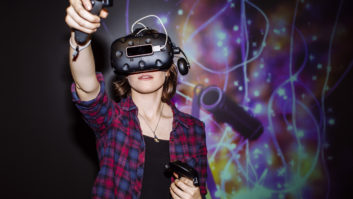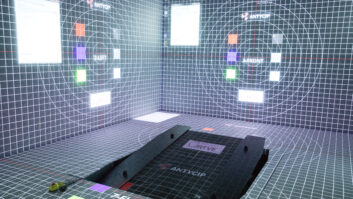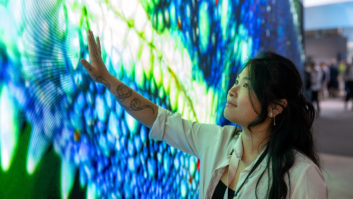In October, the University of Portsmouth finally launched its ground-breaking Centre for Creative and Immersive XR (CCIXR), a £5.2 million pound development bringing world-leading XR facilities to England’s south coast. CCIXR brings the transformative benefits of XR to a broad spectrum of sectors, and builds upon 15 years of cutting-edge research and innovation expertise at the University. The intention of CCIXR is to bring immersive technologies together and use them in new and unique ways to solve real-world challenges.
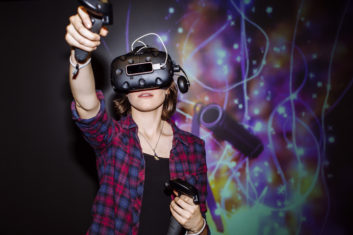
CCIXR features cutting-edge technology from 12 different areas, including motion capture, volumetric capture, photogrammetry, virtual production, and simulation technologies. The co-location of all these facilities under one roof, as an interconnected Centre, enables the CCIXR team to capture, manipulate and utilise a wide range of data across the whole immersive pipeline, from the capture of the data at the start of the project all the way through to completion and distribution.
“The educational benefits of co-locating these technologies are immense,” explains Pippa Bostock, business and development project manager at University of Portsmouth, “as students will be able to understand and see first-hand the whole pipeline, giving them a better multidisciplinary understanding of how projects come together as a whole.”
INVESTMENT PARTNERS
The University of Portsmouth’s investment, in partnership with Solent Local Enterprise Partnership and HM Government, is intended to help meet the needs of not only students, but also those of industry. CCIXR is a UK first, and is designed to boost the city’s economy, cultural regeneration and community development
The University intends to address the skills shortage, providing access to facilities and training, working in partnership and also through demonstrating the transformative powers of extended reality (XR) technologies. Extended reality, of course, is a relatively new term for a broad range of creative technologies, including virtual reality (VR), augmented reality (AR) and mixed reality (MR).
“The educational benefits of having access to world-leading equipment and facilities are immense and immediate – allowing our students to have hands-on experience with the tools of their future trade,” says Bostock. “Our students are not the only intended beneficiary; CCIXR has been designed to meet the needs of businesses and practitioners across the Southcoast and beyond.”
SELECT FEW
Currently, many immersive technologies – such as motion capture – are available only to a select few who are already aware of the benefits, and can afford the substantial initial outlay needed in order to set up a facility. CCIXR aims to lower the barrier to entry, enabling artists, businesses and practitioners to access these facilities, and crucially to gain the skills they need in order to maximise the benefits these technologies bring.
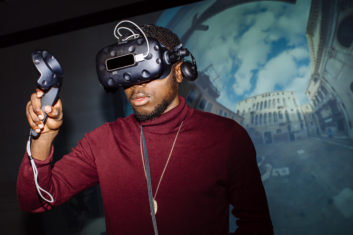
XR technologies have become much more mainstream in the last year or so – certainly in terms of public consciousness. Virtual production has seen a huge boom in popularity since Disney’s The Mandalorian openly shared extensive use of this technology. Covid-19 and the shift to remote working has further driven interest levels in the options offered by XR, and this is unlikely to change anytime soon. The success of the VR headset Oculus Quest (1 and 2) is another clear step on the journey to XR adoption, with over 1 million headsets sold so far, and an estimated $150 million dollars generated in sales revenue over an 18 month period. And, of course, the term ‘Metaverse’ is now on everyone’s lips – including Mark Zuckerberg’s. Facebook the company is now, of course, called Meta.
Despite growing awareness, much of the world-leading XR content is currently only available to a minority, and many have not yet had the opportunity to experience the power and wonder XR can deliver.
“XR has a wide multitude of use cases, ranging from defence through to culture,” says Bostock. “In order for businesses to understand what XR means for them, and how it can help, they need to see it, touch it and interact with it themselves. That is why CCIXR has been developed, to demonstrate that potential.
“CCIXR will work across all sectors, helping them to understand what XR means for them. The team is ideally-placed to do so, and over the last few years we have worked on a wide range of industry collaborations – from IBM through to the NHS. Each of those innovative and unique projects share one common goal: to push the barriers of possibility, through the creative use of technology in their sector. Bringing creativity and innovation together with technology in this way is a core foundation of CCIXR, allowing real-world problem-solving to shine.”
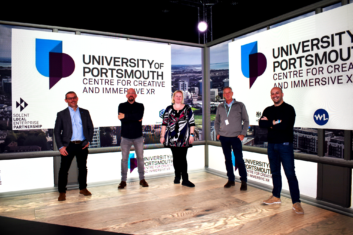 Bostock flags up the considerable growth in VR for training applications, and recent examples within the CCIXR team include a Royal Navy training simulation which trains the user to drive a Rigid Inflatable Boat (RIB), a chemotherapy meditation simulation and a large-scale immersive theatre project in partnership with the Royal Shakespeare Company (a live, streamed performance of Dream, based on William Shakespeare’s A Midsummer Night’s Dream utilising Vicon motion capture cameras).
Bostock flags up the considerable growth in VR for training applications, and recent examples within the CCIXR team include a Royal Navy training simulation which trains the user to drive a Rigid Inflatable Boat (RIB), a chemotherapy meditation simulation and a large-scale immersive theatre project in partnership with the Royal Shakespeare Company (a live, streamed performance of Dream, based on William Shakespeare’s A Midsummer Night’s Dream utilising Vicon motion capture cameras).
“The new facilities, in partnership with world-leading companies such as White Light and Vicon will enable us to bring those benefits to even more companies, helping to make the future real today,” she says.
FUTURE DEMAND
The skills that graduates of CCIXR are likely to boast are hugely in demand. StoryFutures XR (2019) report showed that graduates with these immersive XR skills – with the ability to use real-time games engines, and apply these in real-time to other sectors – are so rare and almost mythical that the report called them unicorns! “In effect, CCIXR will be a unicorn farm, as we aim to directly address that skills shortage – working hand-in-hand with industry to do so,” states Bostock.
“There is wide evidence of the economic impact of the creative industries; however there is also a clearly evidenced skill shortage – which if unchecked will limit the ongoing growth of this key sector. CCIXR is vital, not only as a first-class education tool, but in enabling businesses. Portsmouth was recently recognised as the number one entrepreneurial city in the UK, making it a great place to start a business in the UK. This wider eco-system will hugely benefit from the facilities and training opportunities that CCIXR will provide.”
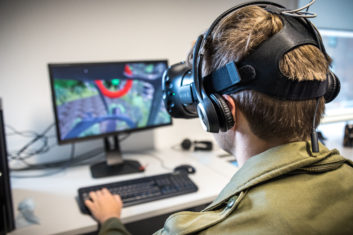 This industry-led approach will be crucial to graduates successfully achieving high-value industry opportunities upon graduation. Indeed, it was recently announced that the facility is leading a new project that will use extended reality technology to help boost the city’s visitor and cultural economy, following a successful bid for £628,000 by the Enabling XR Enterprise (eXRe) project, as part of the government’s £220m UK Community Renewal Fund. The project will run from November 2021 through to June 2022, including the eXRe showcase in June 2022.
This industry-led approach will be crucial to graduates successfully achieving high-value industry opportunities upon graduation. Indeed, it was recently announced that the facility is leading a new project that will use extended reality technology to help boost the city’s visitor and cultural economy, following a successful bid for £628,000 by the Enabling XR Enterprise (eXRe) project, as part of the government’s £220m UK Community Renewal Fund. The project will run from November 2021 through to June 2022, including the eXRe showcase in June 2022.
The eXRe project is being led by the University’s Centre for Creative and Immersive eXtended Reality (CCIXR), in partnership with The Mary Rose Trust, Spinnaker Tower, Victorious Festival, Gosport Borough Council, Aspex Visual Arts Trust and The D-Day Story, will see the creation of innovative XR projects at each of the six partner organisations to increase visitor numbers and to “inspire and excite”.
DRIVING INNOVATION
Around 100 businesses and organisations of all sizes, public and private – mainly from within the heritage and visitor attraction sector in the city – will also be targeted to drive innovation and deliver much-needed skills and expertise in XR technology. These will include: support to create an XR innovation plan to help them gain an understanding of XR tech and its benefits and identify skills gaps and challenges; specialist courses, workshops and seminars; networking events to build a heritage/tourism community to explore XR and its benefits.
“This is an exciting project that brings together local businesses and organisations to support and enable culture-led regeneration in our heritage and visitor economy across the city,” explains Professor Trevor Keeble, executive dean of the Faculty of Creative and Cultural Industries at the University.
“XR innovations and digital technologies are fundamental to Portsmouth becoming a global
city. Enhancing our heritage and visitor attractions will encourage more tourists. While these new artefacts will bring exciting new experiences, the legacy, including the innovation that this project will inspire, will have an enduring impact on the city in
the long-term.
“Importantly, eXRe will draw on the fantastic work and skills of students and staff in the University and will create more jobs in the growing XR sector, hopefully encouraging our graduates to set-up their own businesses in the city and allowing Portsmouth to retain the incredibly valuable skills.”
Bostock added: “CCIXR’s unique blend of innovation and business support, technological expertise, and world-class facilities provides a significant opportunity, with cutting-edge creative and immersive technologies central to the project.
“Opening our facilities and expertise to the city will provide a huge boost to businesses and organisations and help to raise aspirations and inspire future generations to engage with technology.”
